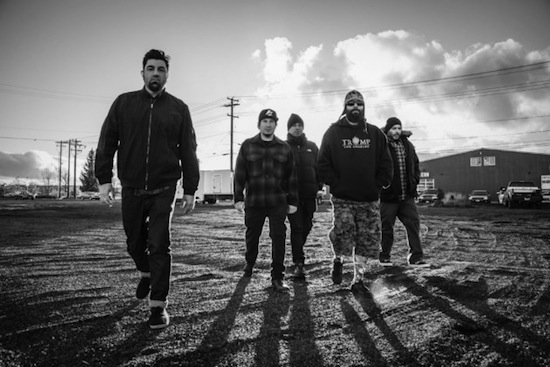“April is the cruellest month, breeding
Lilacs out of the dead land, mixing
Memory and desire, stirring
Dull roots with spring rain.”
T.S. Eliot, The Waste Land
If T.S. Eliot lived today he might deem every damn month as “the cruellest”. But leaving that reasonable “We’re all fucked” viewpoint aside, the only way to survive nowadays is to find some semblance of joy while we cope with the daily grind of capitalism, the atrocious acts of terrorism, the abundance of hate spewed through social media channels – not to mention the personal battles that rage inside us. We all handle these internal and external difficulties in different ways, and for most metal fans, the music is the essential escape. The beauty of metal’s ever-growing spectrum of styles is how even the most negative, dissonant sounds can be just as cathartic and serotonin-spiking as the more melodic old-school classics. Each month we wade through releases which span every metal subgenre imaginable and while there are dozens that should have died at birth, metal in its many forms continues to thrive in the face of cultural and commercial challenges.
Some of the artists covered this month have been releasing influential music for years and the one commonality they share is their desire to continue to push beyond their comfort zones. Whether it is Ihsahn’s permanently evolving solo project, Cult of Luna’s recent collaboration with the mesmeric Julie Christmas, or Deftones shifting towards a more expansive, textured sound for their first record since bassist Chi Cheng death in April 2013 – becoming complacent is not an option for these leading acts. The same can be said for less established bands highlighted below, particularly Schammasch, who have pulled off the dreaded triple album. Records like Schammasch’s Triangle prove that art should not come with a safety net or a defined set of rules. Indeed, greatness comes from the calculated risks we take, and The Quietus will forever champion those who dare to feast on, or illuminate, the darkness.
Ihsahn – Arktis.
(Candlelight)

Vegard Sverre Tveitan, known to most as Ihsahn, is one such fearless artist who constantly illuminates through his progressive approach to extreme metal. The former Emperor composer has blazed his own creative trail since the 1990s, and he is now rightly regarded as one of the most influential metal musicians ever. Ihsahn’s solo work has been thrilling to behold, as the Norwegian mastermind continues to chase his ever-changing muse from album to album. Ihsahn has arrived at Arktis. with his widest palette of sounds to paint from, thanks to the difficult yet rewarding 2013 album, Das Seelenbrechen. Arktis. is a reaction to its greatly improvised and experimental predecessor: Ihsahn has written a prog-infused heavy metal album with major emphasis on musical and vocal hooks. Thematically this album focuses on Norse explorer Fridtjof Nansen’s North Pole trek in the 1800s, and icy melodies shine through ‘Disassembled’ and the galloping ‘Mass Darkness’ which makes these songs more accessible than Ihsahn’s recent fare. Indeed, ‘South Winds’ will set leather/PVC-clad arses shaking on dance floors at metal club nights the world over, with its pulsing electronica and catchy, bass-heavy grooves melding perfectly with the progressive instrumentation. Elsewhere ‘Until I Too Dissolve’ sees Ihsahn channelling inspirations from his youth, predominately Scorpions and Priest, and the heady prog of ‘My Heart Is Of The North’ competes with his contemporaries in Opeth. Throughout Arktis., the interplay between Ihsahn’s harsh and clean vocals have never sounded so natural and the guest appearances from Leprous vocalist Einar Solberg, Trivium’s Matt Heafy and Shining’s saxophonist Jørgen Munkeby are welcome contributions used to round out a diverse album that moves from uplifting to threatening to majestic to soulful. All this is achieved with the effortless songwriting poise you would associate with a master craftsman like Ihsahn.
Deftones – Gore
(Warner Bros)

The use of the word “mature” when describing the music of an established metal band usually causes readers to vomit in their mouths, because with that descriptor comes the immediate impression that you mean “lifeless” or “boring-as-hell”. Deftones’ latest album Gore does indeed display the songwriting maturity expected of an act of their vintage, and while it’s not as startlingly immediate as Around The Fur or Diamond Eyes, the understated, slow-burning approach perfectly fits the legendary band at this stage of their career. The rich electronic textures of Frank Delgado are essential to the layered compositional direction of Gore – both he and vocalist Chino Moreno often soak up the limelight. Moreno’s lyrics paint vivid psycho-sexual images in your mind as he croons and occasionally shrieks in his inimitable style, while the push-and-pull-tension between his ethereal vocal offerings and the dynamic playing of guitarist Stephen Carpenter remains central to the band’s unique sound. Outside of the juddering Meshuggahisms and thrash-flecked aggression of ‘Doomed User’ and the hardcore beatdown of the title track’s chorus, Deftones rarely go for the jugular – much to the chagrin of Carpenter, as reported recently. Instead they effectively wield tension as weapon on the anxiety-inducing ‘Geometric Headress’, immerse the listener in depths of crystalline beauty on the emotionally charged ‘Hearts/Wires’ and ‘Phantom Bride’, and recall Siamese Dream-era Smashing Pumpkins on the ‘90s alternative rock-inspired ‘(L)MIRL’. In fact, every song is distinguishable while also interlinked to form a cohesive whole that flows organically from start to finish. It’s true that Gore does not fully reveal itself on the first couple of listens, which makes it esoteric charms all the more interesting, but the spectrum of sounds and range of emotions embedded here become three-dimensional and sensory the more time you allow it to envelop you – just like White Pony did fifteen years ago.
Cult of Luna & Julie Christmas – Mariner
(Indie Recordings)

Once again the internet plays a vital role bringing to life another interesting collaboration inside the heavy sphere. This time the elemental force that is Cult Of Luna enlist the idiosyncratic vocals of Julie Christmas (Made Out Of Babies/Battle Of Mice) for Mariner, the Swedish collective’s seventh studio album. After Vertikal – the Metropolis-inspired 2013 album and EP – took Cult of Luna’s industrial metal elements to their most austere conclusions, they have looked beyond the “cold harshness of the mechanical city” and have cast their gaze skyward, towards “the vastness of space”. Brooklyn-based Christmas was more than content to follow their lead and her many voices suit the variety of moods Cult Of Luna create on Mariner. She has Bjork-like ability to morph into different characters, as heard on vocal highlight ‘The Wreck Of S.S. Needle’, where she coos softly in your ear one moment and slits your throat the next. Like Isis and Neurosis, Cult of Luna are just as devastating at a near whisper as they are tumultuously raging towards the cosmos. More spacious passages recall Pink Floyd’s Wish You Were Here and even the works of Tangerine Dream and Vangelis, but the Umeå unit have appropriated their influences so well at this stage that their emotionally and physically crushing sound belongs to them alone. From ‘A Great Call’ to ‘Cygnus’, this collaboration amounts to a complete success – it’s another Cult Of Luna album loaded with intimate intricacies and powerful post-metal crescendos.
Mantar – Ode To The Flame
(Nuclear Blast)

To say that Ode To The Flame is a huge opportunity for Mantar, the Hamburg sludge duo comprised of guitarist/vocalist Hanno Klänhardt and drummer/backing vocalist Erinc Sakarya, would be an understatement. This is the band’s first release for Nuclear Blast, whose massive industry pull is capable of exposing the talented pair to a wider metal audience. Prior to signing with the leading label however, Mantar were beginning to make plenty of noise on the live circuit in support of their incendiary 2014 debut, Death By Burning – an album that combined the hulking grooves of the Melvins, Southern rock jives, the rhythmic angularity of noise-rock, and the untamed spirit of hardcore punk. On Ode To The Flame Mantar retain everything that made their debut special while amplifying the rock & roll side of their sludgy sound to great effect. ‘Praise The Plague’, ‘Era Borealis’, ‘Born Reversed’ and ‘Cross The Cross’ are anthemic, groove-orientated songs that chug and stomp with instinctual force because of the deep chemistry that exist between the duo, finding the difficult-to-capture sweet spot between catchy and hard-as-nails. The feared “second album failure” has been smashed into oblivion here, and thankfully Mantar haven’t compromised one bit to do so.
Inverloch – Distance | Collapsed
(Relapse)

With their first full-length, Distance | Collapsed, Inverloch have fully emerged from beneath the imposing shadow of guitarist Matthew Skarajew and drummer Paul Mazziotta’s esteemed former band, diSEMBOWELMENT. While the dank subterranean ambience that helped make diSEMBOWELMENT’s Transcendence Into The Peripheral (1993) such a doom-death milestone remains, Inverloch’s approach to both immersive atmospherics and dense riff craft is decidedly more involved and evolved. Building upon their impressive 2012 EP, Dusk | Subside, which led to the Australian band signing with Relapse, Distance | Collapsed is supremely dynamic and intelligently structured – traits not usually synonymous with this often one-dimensional style of extreme metal. This is down to the fact that the five musicians involved are seasoned veterans who understand how to strike the requisite balance between the emotional weight of sepulchral doom and the blistering hellfire of death metal. Armed with a huge production sound and a guitar tone Tom G. Warrior would give his left-hand seat in hell for, each song bellows from the abysmal depths with knee-buckling force, whether thundering along with the same wicked malevolence as Morbid Angel (‘Lucid Delirium’) or dropping to a woebegone, punishing crawl (‘Cataclysm Of Lacuna); or both, as heard on cavernous highlights – the eponymous opener and ‘The Empyrean Torment’.
Rotten Sound – Abuse To Suffer
(Season of Mist)

Judging by the quality of each passing release since 2002’s Murderworks, you get the impression Rotten Sound are priming themselves to race to the front of the grindcore pack the second Napalm Death finally put their boot down on the self-destruct button. The British grind-fathers influence on this subgenre is all-encompassing and so these ferocious Finns are founded on the same zeitgeist-smashing ideology – hell, they even released an EP in 2010 called Napalm, which came loaded with three tribute covers. Full-length seven Abuse To Suffer doesn’t set fire to the rulebook, nor does it have to: Rotten Sound’s combo of serrated HM-2-powered Swedish death grooves and hyper-speed blast-outs & D-beats, led by Keijo Niinimaa’s array of fierce screams, are time-tested and continuously sharpened. However, it would be interesting to hear Rotten Sound chuck a couple of curveballs into the mix at this stage of their existence, just to keep the tinnitus-riddled listeners on their toes. For now, from front to back, we’re presented with another primed collection of face-strippers from this seasoned four-piece, who have been rattling venues and fighting injustice for over twenty years and show no signs of stopping their vitriolic bombardment on the senses and the system.
Amon Amarth – Jomsviking
(Metal Blade)

Like Rotten Sound, Amon Amarth have completely defined their style at this stage of their lengthy career and you can trust them to at least be consistent. The melodic death metal attack the Stockholm band favour may have become more “mainstream-friendly” in the past decade, but with that came stronger songwriting. The skills of guitarists Olavi Mikkonen and Johan Söderberg were put to the test on their new album, titled Jomsviking, as they embarked upon writing around a cohesive concept brought in by man-beast vocalist, Johan Hegg. The love- and death-based story also involves the Jomsviking, a fearsome band of elite mercenary Vikings, and each song tells part of the saga written by Hegg. The results are slightly more cinematic than what we’ve heard from the band before, as the mostly mid-paced metal – aided by a spacious mix from Andy Sneap and the propulsive session drumming by Vomitory’s Tobias Gustafsson – ebbs and flows in tandem with Hegg’s roared, yet clearly enunciated tales. From bloodthirsty opener ‘First Kill’ to the imminent live favourite, ‘Raise Your Horns’, and pillaging onwards through the heavy metal classicism of ‘At Dawns First Light’ and ‘Back On Northern Shores’, Amon Amarth do what they do best: create beer-swillin’ and head-bangin’ odes to the icy north and those longboat-ridin’, axe-wieldin’ marauders who once ruled their lands.
Schammasch – Triangle
(Prosthetic)
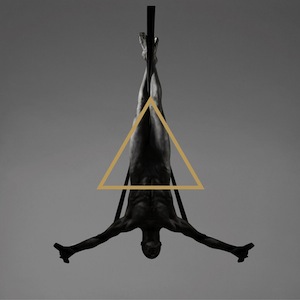
Chris S.R., the talent behind Swiss avant-metal act Schammasch, has created a triple album spanning 100 minutes, split into three distinct movements which explore the significance of that number in religious mysticism. On paper, Triangle is an intimidating proposition for even the most dedicated fan of the band. But as we saw with 2014’s breakout double album Contradiction – which confidently straddled the divide between recent master works by Behemoth and Triptykon – Schammasch have the ability to pull off such an elaborate endeavour. I: The Process of Dying is a lead-in, a gripping continuation of the atmospheric doom/death/black metal amalgam of Contradiction, while III: The Supernal Clear Light Of The Void is a complete contrast: a primarily instrumental ambient piece, one that although carefully constructed, will undoubtedly split opinions. The real genius is found on II: Metaflesh, however, as Schammasch expand their sound in numerous ways. They create dramatic post-metal with ‘The World Destroyed By Water’, a song clearly inspired by Cult of Luna’s Vertikal. ‘Melanoia’s black metal blasting teamed with gothic clean vocals and virtuosic guitar solos is a joy to behold. And the same can be said for the striking Floydian sweep of highlight ‘Above The Stars of God’, which gives way to the gentle folk-based finale, ‘Conclusion’.
Beastwars – The Death Of All Things
(Destroy Records)
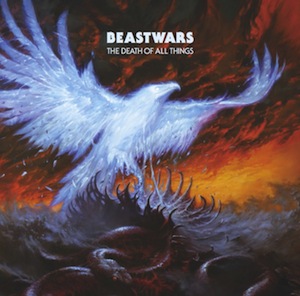
It’s a crying shame that the archipelago-rattling sludge of New Zealand’s Beastwars has yet to receive the acclaim it deserves. This is down to geographical limitations rather than talent, mind: this four-piece are as good as any band operating within their chosen genre to date. Their previous two albums, 2012’s self-titled and 2013’s Blood Becomes Fire, combined the molten metal of High On Fire with the Sky Valley grooves of Kyuss and the heavier aspects of Seattle grunge, while audibly maintaining a strong affinity towards the jolting, polluted rhythms of many an Amphetamine Reptile. Third album The Death Of All Things, like Mantar’s Ode To The Flame, amplifies the hard rock side of the band’s sound without sacrificing their core style or losing an ounce of the intensity that fuelled their earlier material. Vocalist Matt Hyde once again steals the show: he mumbles ominously, sings gruffly, howls manically at the black sky, and screams like he’s glaring into damnation’s beckoning pit – sounding like a vocal tryst between Tom Waits, Matt Pike and David Yow in the process. The frustration of life is felt through his delivery and every lurching riffs and rhythms, and you’re left with the impression that Beastwars hurled everything they have at this album. It’ll either be the release that truly breaks the band or the record that sets them free.
Howls Of Ebb – Cursus Impasse: The Pendlomic Vows
(I, Voidhanger)
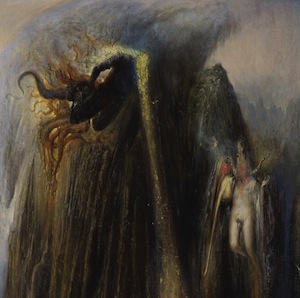
Howls of Ebb inhabit the same surreal, nightmarish headspace as Portal. For starters, just look at the convoluted pseudonyms the band’s two members operate under: Zee-Luuuvft-Huund and Roteen’ Blisssss. The former handles “vibrations, low auras, polysyllabic morbid mysticisms” (we reckon that’s “guitars, bass and vocals”) while the latter holds down “cadence of limp and duress, bronze aura” (“drums”, surely?). Yes, it’s completely ridiculous and these guys must have a sense of humour, but the music they create is deadly serious – it’s the aural equivalent of the bizarre occult painting by Agostino Arrivabene which adorns the cover of their new album, Cursus Impasse: The Pendlomic Vows. The press release declares Howl Of Ebb’s second full-length as a “master pendulum of transgressive osmotic reign” and while we have a stroke trying to discern what that means, the music, a skronk-heavy black/death hybrid, sets fire to our synapses. It’s exactly what you would have expected the last Twilight album featuring Thurston Moore to sound like: aesthetically pitch black with jarring screeds of atonal guitar. On top of that, forked tongue vocals, like a (more) possessed Lord Worm, jabber and disappear throughout as the music scales back into the darkest recesses of your mind only to reappear seconds later more jagged and disorientating than before. Warning: Do not listen to this album while watching anything created by David Lynch or David Cronenberg.
Church Of Misery – And Then There Were None…
(Rise Above)

Cult Japanese doom act Church Of Misery, now helmed solely by original bassist Tatsu Mikami, are unabashed disciples of Sabbath. The swing of the drums and the distorted blues shuffles amongst rolling proto-metal power chords and Iommic tri-tone trills have formed Church of Misery’s sound for 15 years. Toss in the band’s serial killer obsession and a love of old psychedelic rock and you’ve a hell of a bloody blueprint, one expectedly followed on latest album And Then There Were None…. The recent addition of Repulsion legend Scott Carlson on vocals really fits the raw-boned riffs and sativa-stained grooves, which amplify the blues side of the band’s sound courtesy of new guitarist David Szulkin (Blood Farmers) and drummer Eric Little (Earthride). Carlson also continues the band’s tradition of sourcing some of the most reprehensive killers in history, opting for more obscure subject matter such as Leonarda Cianciulli (‘Confessions Of An Embittered Soul’), an Italian axe-murder who made soap and teacakes from the fat of her victims, and a demented family from the Old West (‘The Hellbenders’), who murdered their house guests and buried their dismembered bodies in their apple orchard. Rehearsed and recorded in a two-week period, it’s gore-drenched business as usual for these Murderfreaks. Let’s hope their reign of terror continues with this line-up intact for the foreseeable future.
Wode – Wode
(Broken Limbs)
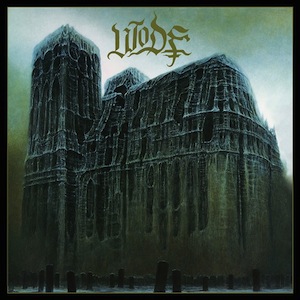
Long gone are the days when Cradle Of Filth’s gothic bombast almost single-handedly propped up British black metal. Currently the UK scene is vital as any other, with numerous exciting acts making their mark internationally. With their excellent self-titled debut you can now add Manchester’s Wode to the growing list headed up by Winterfylleth, A Forest of Stars, and Voices. It has been five years since their demo and the band has developed considerably as composers in that time. Avoiding stale genre tropes yet surprisingly remaining staunchly orthodox, the six songs that comprise their first full-length hold many twists and turns for the listener – most of which come from good old-fashioned songwriting skills. Wode twist emotions, from rage to sorrow, and do so through a combination of throttling tremolo and blast beats surges, triumphal riffs and mournful codas. The transitions are seamlessly constructed (clearly a result of the album’s lengthy gestation period), so much so that it takes a keen ear to truly appreciate how watertight these songs actually are. Passionate playing in black metal has become a thing of the past as too many bands focus on how many Joy Division/The Cure signifiers they can shoehorn in. Wode might be traditionalists – they see how the black flame of this diabolical subgenre should burn – but the fervent manner by which they attack this sacred sound sets this band apart from their more experimentally-minded/weaker peers.

